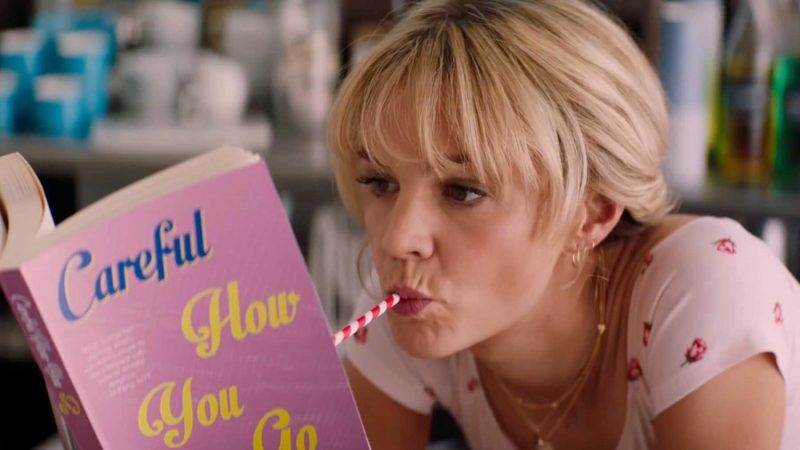Warning: Spoilers. Promising Young Woman is a 2020 film directed by Emerald Fennell. Ostensibly taking the form of a rape revenge fantasy, the film is really about drawing attention to rape culture and the “nice” people that enable it. The film asserts a distinctly female gaze in the process.
The films begins with protagonist Cassie (Carey Mulligan) pretending to be drunk at bars, honey-trapping “nice guys” into taking her home where they inevitably begin to take advantage of her. When they ignore her “drunken” protests, she makes them realize that she’s sober and they’re doing the wrong thing. This is Cassie’s original “revenge” format, educating men one at a time through awkward moments to make them realize they’re not as “nice” as they think they are.
Then she meets pediatric surgeon Ryan (Bo Burnham) and finds that he’s still friends with Al, the man who raped her friend Nina in med school seven years earlier. The rape was not investigated, Nina died by suicide and Cassie dropped out of school. This is why Cassie works in a cafe and spends her spare time chasing revenge; clearly the rape and loss of her friend caused great trauma. After meeting Ryan and starting a relationship with him, she sets out to take her revenge on Al and all those who enabled him. Yet her revenge is not the typical Hollywood type. Cassie simply turns her drunken bar tactics on her new targets, forcing them to confront their own complicity and guilt. Her final target is Al, but things don’t turn out as the audience expects.
The Female Gaze In Promising Young Woman
Promising Young Woman embodies the female gaze in a number of ways. Firstly it gives us a rounded female protagonist and deals with an issue of particular interest to women – the way that rape is consistently played down and excused in our culture. It also does this without sensationalizing the rape itself; the film refuses to show the assault. Instead, we witness Cassie’s fresh response to it, as she watches the filmed crime on a phone. Here we are invited to feel as Cassie feels, to understand why she pursues revenge as she does and to empathise with the victim.
The film subverts the tropes of the rape revenge film – a genre that may have female protagonists but often still assumes a male gaze. Cassie is never violent; her weapons are mainly questions. When violence and objectification do occur in the film, it’s the male characters who enact it against Cassie herself. The film refuses to play along with what we assume will happen. It forges new paths and offers a divergent narrative. Revenge may be satisfying but it is ultimately self destructive and the film plays with this theme in an unexpected way.
Eye Contact
As mentioned in the “In The Frame” video above, the film often includes shots of Cassie looking down the camera lens, with reverse angles of the other characters doing the same. Like Silence of the Lambs, these shots encourage us to see things from Cassie’s perspective. In the early scene when Cassie switches from “drunk” to vengeful sober, she signals the moment by looking directly at the camera. Until this point, the audience has been a passive part of the scene, seemingly watching the awfulness of an assault unfold on screen. The woman is the object, the man is the subject. There may even be some voyeuristic pleasure involved. Yet this scenario snaps the moment Cassie makes eye contact with the camera. Suddenly, we’re invited to look again, to rethink what’s happening – and to take her side.
Cassie uses her gaze to assert power over the men she meets. She does this in the opening sequence when she stares down catcalling construction workers.
No Concessions
One could argue that the film has a female gaze because it refuses to make concessions for any male character. The men in the film think of themselves as good people, yet Cassie shows them to be complicit. The production crew deliberately cast performers known for previous positive roles in order to encourage the audience to see them as “nice guys”. The Ringer writes: “Their performances in the film, which emulate their previous roles but with a sinister twist, perfectly capture the film’s message that anyone could be a predator, and anyone could be complicit.”
This hits home with the character of Ryan. For a while it seems that he’s an outlier, one of the good ones; an embodiment of “not all men”. Yet in the end, even Ryan doesn’t escape Cassie’s revenge. That’s not to say that the film lets women off the hook, of course, but it is still worth noting how it goes out of its way to make the point with Ryan. The film tricks us into hoping he’ll be the one to save her but ultimately he’s doomed from the moment they first meet.
Promising Young Woman was written, co-produced and directed by Emerald Fennell, and financed by Margot Robbie’s production company LuckyChap Entertainment. It won the Best Original Screenplay award at the 2021 Oscars and was nominated in four other categories.
